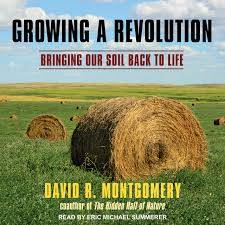Submitted by The San Juan Island Library
David Montgomery returns to San Juan Island just in time for gardeners and farmers who are busy preparing their soil for spring planting. Join for another lively and informative book talk at the library on Saturday, April 7 at 7 p.m. This talk will get attendees to think differently about soil and its health. Montgomery will be talking about his latest book, “Growing a Revolution” — a revolution to increase the personal and planetary health by focusing on the ground.
Montgomery, a MacArthur Fellow, makes an impassioned call in “Growing a Revolution” to make agriculture sustainable by ditching the plow, covering the soil and diversifying crop rotations.
The problem of agriculture is as old as civilization. Throughout history, great societies that abused their land withered into poverty or disappeared entirely. Now, everyone risks repeating this ancient story on a global scale due to ongoing soil degradation, a changing climate and a rising population.
But there is a reason for hope. Montgomery introduces readers to farmers around the world at the heart of a brewing soil health revolution that could bring humanity’s ailing soil back to life remarkably fast. “Growing a Revolution” draws on visits to farms in the industrialized world and developing world to show that a new combination of farming practices can deliver innovative, cost-effective solutions to problems farmers face today.
Cutting through standard debates about conventional and organic farming, Montgomery explores why practices based on the principles of conservation agriculture help restore soil health and fertility. Farmers he visited found it both possible and profitable to stop plowing up the soil and blanketing fields with chemicals. Montgomery finds that the combination of no-till planting, cover crops and diverse crop rotations provides the essential recipe to rebuild soil organic matter. Farmers using these unconventional practices cultivate beneficial soil life, smother weeds and suppress pests while relying on far less, if any, fertilizer and pesticides.
These practices are good for farmers and the environment. Using less fossil fuel and agrochemicals while maintaining crop yields helps farmers with their bottom line. Regenerative practices also translate into farms that use less water, generate less pollution, lower carbon emissions, and stash an impressive amount of carbon underground. Combining ancient wisdom with modern science, “Growing a Revolution” lays out a solid case for an inspiring vision where agriculture becomes the solution to environmental problems, helping feed us all, cool the planet, and restore life to the land.
Montgomery is a professor of geomorphology at the University of Washington. He lives in Seattle with his wife, Anne Biklé, and Loki, their guide-dog dropout. He is the author of “Dirt: The Erosion of Civilizations”; “The Rocks Don’t Lie: A Geologist Investigates Noah’s Flood”; and co-authored with Anne Biklé “The Hidden Half of Nature: The Microbial Roots of Life and Health.”




